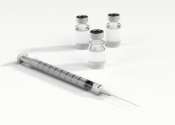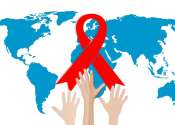Medical research news
Better than stitches: Researchers develop biocompatible patch for soft organ injuries
University of California, Los Angeles and University of California, San Diego researchers developed an injectable sealant for rapid hemostasis and tissue adhesion in soft, elastic organs.

Easily distracted? How to improve your attention span
Feel like you can't focus? Like you'll never finish a book again? Like the only way to keep your mind and hands busy is to scroll on social media for hours?
9 hours ago
0
18

US approves first blood test for Alzheimer's
The United States on Friday approved the first blood test for Alzheimer's, a move that could help patients begin treatment earlier with newly approved drugs that slow the progression of the devastating neurological disease.
16 hours ago
0
38

The words of health care providers during prenatal care visits can influence how parents see their children
Pregnancy is often a unique experience, marked by anticipation and mental representations of what will happen after a baby's birth. Understanding how people's experiences while pregnant influence their parenting skills and ...

Psychological treatment linked to physical brain changes that ease chronic pain
Back pain, migraines, arthritis, long-term concussion symptoms, complications following cancer treatment—these are just a few of the conditions linked to chronic pain, which affects 1 in 5 adults and for which medication ...
May 16, 2025
0
65

Chronic pain and mental well-being linked to IBS risk: Genetic study identifies modifiable factors
Irritable bowel syndrome (IBS) is a prevalent and debilitating gastrointestinal disorder affecting approximately 5%–10% of the global population. Characterized by abdominal pain, bloating, and altered bowel habits, IBS ...
May 16, 2025
0
41

New discovery about how acetaminophen works could improve understanding about pain relievers
A new study from Indiana University scientists may aid the pharmaceutical industry in better understanding a popular over-the-counter pain reliever: Tylenol.
May 16, 2025
0
27

Fruit fly study links Alzheimer's proteins to widespread organ changes and sensory decline
While Alzheimer's disease is mostly considered a disorder of the brain, emerging evidence suggests that the condition also affects other organs of the body. Working with the laboratory fruit fly, researchers at Baylor College ...
May 16, 2025
0
24

Thousands of cardiac 'digital twins' offer new insights into the heart
For the first time, researchers from King's College London, Imperial College London and The Alan Turing Institute, have created over 3,800 anatomically accurate digital hearts to investigate how age, sex and lifestyle factors ...
May 16, 2025
0
8

Oral norovirus vaccine candidate successfully tested in human challenge trial
Vaxart Inc., in collaboration with researchers from multiple academic institutions, evaluated the VXA-G1.1-NN vaccine against norovirus infection. Findings show a 30% reduction in infection rates among vaccinated participants ...

Study shows infant immune systems respond differently to severe COVID-19
Infants hospitalized with severe COVID-19 have significantly different immune responses than adults or older children. The finding comes from scientists at St. Jude Children's Research Hospital, The Jackson Laboratory for ...
May 16, 2025
0
41

A diabetes paradox: Improved health has not boosted workforce prospects
Advances in medical technology over the last 30 years have made it easier to detect and treat diabetes, leading to significant health improvements in people with the disease. Despite this, workforce participation among people ...
May 16, 2025
0
45

Depression after stroke can seriously affect health for a decade, new research shows
People who experience depression following a stroke may face a higher risk of poor health and even death for up to a decade afterward, new research finds.
May 16, 2025
0
18

AI-powered app enables anemia screening using fingernail selfies
Anemia affects more than 2 billion people worldwide, including an estimated 83 million Americans at high risk. Now, a new app delivers reliable, accessible screening directly to consumers.
May 16, 2025
0
9

A step closer to the confident production of blood stem cells for regenerative medicine
Stem cells can produce any other cell type, it is just a matter of telling them in the right way. From a biological perspective, this means activating the proper genetic program by pressing the right keys, that is, the right ...
May 16, 2025
0
21

Study links inflammation to reduced motivation and brain circuit changes in schizophrenia
A new study from Emory University has identified a biological connection between inflammation and deficits in motivation in individuals with schizophrenia, offering new hope for treating symptoms that have long been resistant ...
May 16, 2025
0
61

How do middle-aged folks get dementia? These proteins provide a clue
Dementia usually affects older people, so when it occurs in middle age, it can be hard to recognize. The most common form is frontotemporal dementia (FTD), which is often mistaken for depression, schizophrenia, or Parkinson's ...
May 16, 2025
0
24

New B meningococcus vaccine shows promise in early-stage trial
The outcome of a trial published in Science Translational Medicine, shows encouraging results for a new vaccine targeting group B meningococcus (MenB), a significant cause of meningococcal disease worldwide, and establishes ...
May 16, 2025
0
22




























































